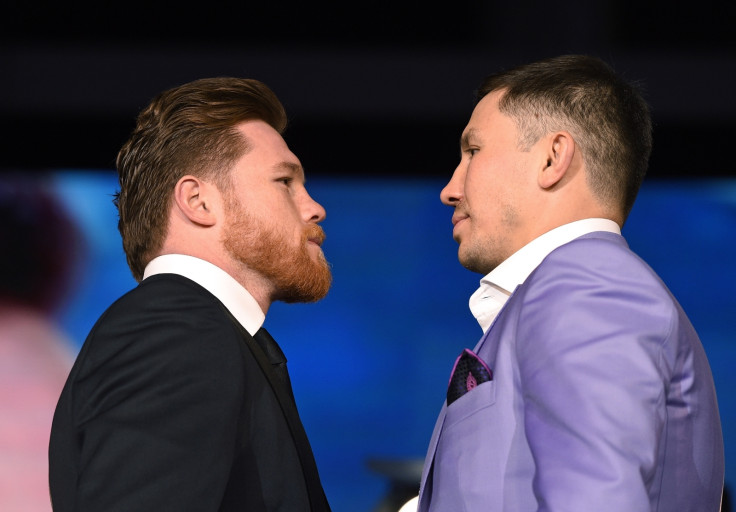Canelo Alvarez vs Gennady Golovkin rematch will take place for one reason despite failed drugs test
The middleweight unification rematch is scheduled for Cinco de Mayo weekend.
Barely 48 hours after Brooklyn had hosted an exhilarating heavyweight title fight between Deontay Wilder and Luis Oritz – a contest which could arguably be enough to reinstate your faith in the combat sport – boxing has shot itself in the foot once again.
Canelo 'Saul' Alvarez's positive test for Clenbuterol can be classed as many things. Intentional cheating or the latest Mexican athlete to fall foul of contaminated meat; either way one of the world's biggest sportspeople has tested positive for a banned substance.
The 27-year-old may have already had his name cleared by the same World Anti-Doping Agency [Wada] lab which tested him, but his name and his eagerly-anticipated rematch with Gennady Golovkin will forever be overshadowed by this episode.
Global sports fans will no longer be fooled by excuses or loopholes and in the 24/7 rolling news vortex, underpinned by social media commentary, you are no more than a click and a scroll from an individual's life story. This could well be Alvarez's epitaph.
The current Ring middleweight title holder will have to live with his status as an elite athlete who has failed a drugs test and whatever he goes on to achieve – he could end Golovkin's unbeaten record when the two clash on Cinco de Mayo [5 May] and then unify the division – this incident is guaranteed to stalk him forever.
Boxing has a more than a chequered record with regards to doping. Saturday's [3 March] bout, for all its brilliance, should never have been staged. Cuban Ortiz has twice tested positive for banned substances, each in the last three years.
In 2015, Ortiz tested positive for nandrolone – the anabolic steroid – from a sample submitted before his first-round knock-out win over Lateef Kayode. He was handed a ban below the standard punishment for a first offence under Nevada State Athletic Commission regulations, of just nine months.
He returned to the ring less than six weeks after the ban expired but just 27 months later he was back in the dock, having tested positive for two banned diuretics, which he claimed he took to treat high blood pressure but failed to disclose to the raft of boxing's governing bodies. Subsequent, the WBC title clash with Wilder due for last November was postponed.
Many sports may have mirrored boxing in handing out a weak punishment after the first offence but thrown the book at an athlete when they relapsed. Instead, boxing embraced Ortiz like an old friend, eventually fining him $25,000 [£18,497] and re-awarding him his title shot against Wilder.
This is not an unfamiliar tale of boxing's unsatisfactory dealing with drugs in their sport. Tyson and Hughie Furym and Alexander Povetkin are among those to benefit in 2017, alone.
Only two months ago Tony Bellew suggested that a doped-up boxer could kill an opponent if allowed to run ragged in the ring, comments which should be bought into sharper focus following the passing of Scott Westgarth.
"What's it going to take with these drug cheats?" he told BBC Radio Five Live. "Is it going to take a man to kill another man in the ring, then fail a drugs test after? What is going to happen when he fails it? Is that man going to go to jail for life?
"Because in my opinion it's murder. And it's pre-meditated murder, that's the most frightening thing. He's gone in there knowing he has an unfair advantage and for that alone he should be locked up for life."
Ortiz was only forced back into action to allow boxing to continue to feed from the trough of riches, and it paid dividends. Showtime report that a peak audience of 1.2m tuned in to watch Wilder's 10<sup>th round stoppage, the most for any bout on the network since the 'Bronze Bomber' beat Bermane Stiverne in their first clash in January 2015.
Promoters and boxing governing bodies have been queuing up to absolve Canelo of any blame for his misdemeanor, which is purported to be supported by the voluntary testing programme he himself requested in the lead-up to the fight.
The WBC and WBA are both convinced of his innocence and who can blame them? The purse for Alvarez and Golovkin's one-sided draw last September approached €50m [Forbes] and took over $27m in ticket sales - the third most in history [Boxing Scene]. The looming rematch, despite this latest setback, can be expected to trump those numbers.
Boxing's partialness for short-termism means few serious questions will be asked internally or even publicly by the powers that be about the latest scandal, so not to damage the potential for pockets to be filled. The sport traded in its integrity decades ago, and is showing no sign of slowing down.























